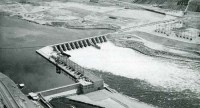Columbia Riverkeeper reached a settlement with Chelan County Public Utility District (PUD) to end uncontrolled toxic pollution from the Rock Island and Rocky Reach dams. This marks the first time that a PUD-operated dam on the Columbia River will comply with the Clean Water Act’s requirement that polluters obtain a permit to monitor and reduce harmful pollution.
FOR IMMEDIATE RELEASE
Columbia Riverkeeper and Chelan County Public Utility District Settle Legal Dispute to End Unlawful Oil Pollution at Two Dams on Columbia River
Settlement marks first time a Columbia River PUD will reduce oil pollution pursuant to the Clean Water Act

March 20, 2019 (Wenatchee, WA)—Columbia Riverkeeper reached a settlement with Chelan County Public Utility District (PUD) to end uncontrolled toxic pollution from the Rock Island and Rocky Reach dams. This marks the first time that a PUD-operated dam on the Columbia River will comply with the Clean Water Act’s requirement that polluters obtain a permit to monitor and reduce harmful pollution.
“People rely on the Columbia River for clean water and healthy fish. Today’s settlement is part of a broader effort to reduce the threat of large oil spills from dams up and down the Columbia and Snake rivers and reduce toxic oil that routinely leaks into our rivers,” stated Brett VandenHeuvel, Executive Director of Columbia Riverkeeper.
The settlement requires the PUD to apply for pollution discharge permits from the Washington Department of Ecology and investigate switching to eco-friendly oils. Hydroelectric dams like Rock Island and Rocky Reach routinely discharge oil and other pollution to the Columbia River, which threaten fish, wildlife, and the people that rely on locally-caught fish. Pollution discharge permits required under the settlement will require that the PUD monitor and reduce the amount of pollution entering the Columbia.
“The settlement sends a powerful message: PUDs have the same responsibility as private companies and the federal dam operators to reduce toxic pollution and prevent dangerous oil spills,” explains VandenHeuvel.
The settlement builds on Riverkeeper’s legal victories against the U.S. Army Corps of Engineers and the U.S. Bureau of Reclamation. In 2013, Riverkeeper sued the Corps for illegally discharging oil and other other pollution from the eight federal dams on the Columbia and Snake rivers without pollution permits required under the Clean Water Act. Riverkeeper brought a similar case against the U.S. Bureau of Reclamation in 2016 for unlawful pollution from the Grand Coulee Dam. Riverkeeper reached settlements with both federal agencies that required the agencies to obtain permits-to-pollute and investigate using less harmful oils in dam equipment.
Last year, Riverkeeper sent notices of intent to sue to three PUDs that operate dams in the Columbia River: Douglas County, Grant County, and Chelan County PUDs. The Chelan PUD settlement, signed March 19, 2019, marks the first legal settlement.
Columbia Riverkeeper is a nonprofit organization working to protect and restore the Columbia River and all life connected to it. Riverkeeper’s staff attorneys and Brian Knutsen of Kampmeier Knutsen, PLLC represented Riverkeeper in the legal action against Chelan County PUD.
###
Background
- Settlement Agreement with Chelan County PUD
- Notices of Intent to Sue the Douglas County, Chelan County, and Grant County Public Utility Districts.
- Information on Riverkeeper’s lawsuit against the U.S. Bureau of Reclamation related to oil spills at Grand Coulee Dam.
- Information on Riverkeeper’s lawsuit against the Army Corps related to oil spills at eight Columbia and Snake river dams.
- Lawsuit filed against the Douglas County PUD for unpermitted discharges from Wells Dam.
About Columbia Riverkeeper
Columbia Riverkeeper’s mission is to protect and restore the water quality of the Columbia River and all life connected to it, from the headwaters to the Pacific Ocean. Riverkeeper works with people in dozens of communities—rural and urban—with the same goals: protecting the health of their families and the places they love. Riverkeeper enforces environmental laws to stop illegal pollution, protects salmon habitat, and challenges harmful fossil fuel terminals. Riverkeeper is a member of Waterkeeper Alliance, the world’s fastest growing environmental movement, uniting more than 300 Waterkeeper organizations around the world.


